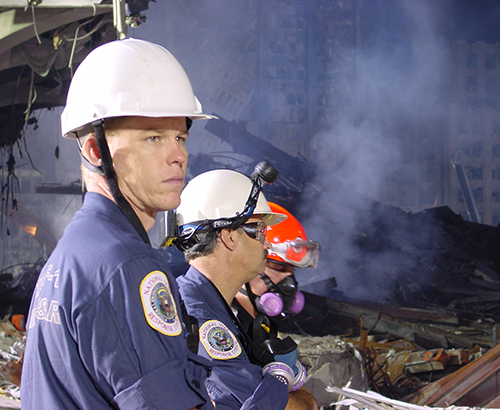Devastating events can open windows of opportunity. In emergency management, focusing events like 9/11 create opportunities for change. Tragedies like 9/11 or devastating hurricanes create a flurry of activity in the short period that follows. This activity typically involves conversations about how to make things better or make change. However, windows for these conversations always close.
 A few days after the 9/11 attack, I took an eerie flight on one of the only airborne planes around the country due to nationwide ground stops. Our team of firefighters (Texas Task Force 1) flew from Austin, Texas to McGuire Air Force Base in New Jersey. Our bus then rolled into New York City about three o’clock in the morning as I slept. Never being to New York City before, I awoke to billowing columns of smoke in the downtown skyline and distinctly remember looking out and seeing the Statue of Liberty. That moment was chilling.
A few days after the 9/11 attack, I took an eerie flight on one of the only airborne planes around the country due to nationwide ground stops. Our team of firefighters (Texas Task Force 1) flew from Austin, Texas to McGuire Air Force Base in New Jersey. Our bus then rolled into New York City about three o’clock in the morning as I slept. Never being to New York City before, I awoke to billowing columns of smoke in the downtown skyline and distinctly remember looking out and seeing the Statue of Liberty. That moment was chilling.
We did not completely understand what we were going to encounter. However, we were as ready as any fire company would be. The days that followed were grueling. Countless crews spent hour upon hour conducting urban search and rescue missions. With a defined 16-block area to work in, we conducted a massive search operation.
Firefighters know that there are three priorities: save lives, protect property, and protect the environment. It was unlikely we were going to find anyone alive. There was not much property to be saved. Our attention then turned to finding ways to give closure to the surviving families.
Everyone carries baggage from devastating events. A five-gallon bucket is my baggage from 9/11. We sat on those buckets and used them to move pieces of the World Trade Center. Seeing those buckets now typically takes me back to that place.

Nim Kidd at World Trade Center response. Source: TEEX (2001).
Remembering Events
Wildfires, hurricanes, tornadoes, and other devastating experiences highlight the need to plan for the worst. Since the bad could always be worse, taking planning efforts to the next level is critical for preparedness.
Learning lessons from victories and tragedies is crucial. Following up on after-action reports and listed recommendations from important moments in an emergency’s response is a must. It is vital to understand the mistakes made and pass that understanding on to avoid repeating the same mistakes. This is especially true for ensuring those who did not experience 9/11 firsthand still understand its impact on society.
The events of 9/11 helped the nation – particularly first responders and people tasked with protecting communities – realize there are bad people who will do bad things and try to ruin daily life. That awakening helps inform the decision-making process to do a better job of keeping communities safe.
Remembrance of what happened 20 years ago should be used to reopen that window of preparedness for individuals, families, and communities.
Reopening Preparedness
This remembrance of what happened 20 years ago should be used to reopen that window of preparedness for individuals and for their families. By taking steps to prepare themselves and their families, individuals can help to prevent the cascading effects of the next disaster from becoming even worse. Taking care of individuals and their families makes it easier to take care of communities. With another milestone of this tragedy, there are also reminders of the unity seen across the United States in the aftermath of the 9/11 attack. Hopefully, these acts of unity will continue beyond the annual tributes.
Those that can remember should remember. There are so many people – from kids in school to sophomores in college – who were not even born when the nation was attacked. To ask this younger generation to never forget is difficult. However, the nation needs to find a way to take better care of families and communities, and to do it in memory of the lives lost on that tragic day.
